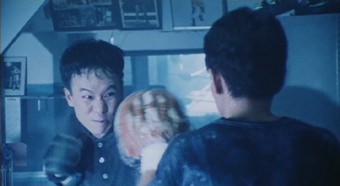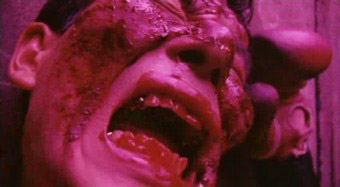|
Young,
cheerless insurance salesman Tsuda shares a Tōkyō apartment
with his fiancé Hizuru. One day he bumps into his childhood
friend Kojima, now a semi-professional boxer, who invites
himself to Tsuda's home and, finding Kojima alone,
attempts to seduce her. Initially she rejects his advances, but
following an argument with Tsuda over just what happened
here, and a fight between the two men that Tsuda spectacularly
loses, Hizuru moves in with the boxer. Humiliated by the
beating and the loss of his girlfriend, Tsuda also takes
up boxing, convinced he can eventually win Hizuru back.
All
of which sounds like straightforward stuff, a familiar
tale of troubled relationships and the rediscovery of self-esteem,
and indeed in other hands it may well have been. But as
directed by Tsukamoto Shinya, one of Japan's most ferociously
creative yet (at least in the West) undervalued auteurs,
this almost soap-like plot becomes the foundation for
one of the director's most direct and extraordinary explorations of his
favourite themes of obsession, humiliation, liberation
and bodily destruction.

If
you've never encountered a Tsukamoto film – and few fans
of Outsider cinema can not have seen his astonishing debut
feature Tetsuo (1988) – then try to imagine
a marriage between David Cronenberg, David Lynch, and a
bucket of amphetamine sulphate, coloured with a splash
of Jan Svankmajer. The tone is set in the manic pre-credits
sequence, as boxers frantically work out to the beat of
a furious techno-rock soundtrack, and a fist is held aloft
against a jolting cityscape and then punches into the camera through
layers of meat and gristle. None of this is there purely
for decoration – boxing, meat, and even the city itself
play an important role in the story that follows.
Like
the above-mentioned North American directors, Tsukamoto
never tries to fool you into believing that you are watching
a straightforward drama before pulling the narrative rug
from beneath – his deliberately twitchy shooting and editing
style creates a sense of a world one step away from reality
from the moment the film begins. Tsukamoto's Tōkyō is an unsettling place
where office blocks seem to visibly radiate an oppressive
force, a location that has the power to crush the spirit of the
ordinary salaryman, a potent metaphor in a society that
still places a high value on the work ethic and conformity.
Tsukamoto himself plays Tsuda as a man whose life is all
routine and no spark, a joyless and downtrodden product
of a corporate world. He and Hizuru spend their evenings
in front of the TV, mindlessly watching old movies and
failing to communicate on any meaningful level, but the
arrival of Kojima (played by Tsukamoto's brother Kōji, a former boxer turned trainer) soon changes all that. At first
playfully mischievous, he deliberately provokes a physical
confrontation with Tsuda that as a professional boxer
he knows full well he will win. It's a scene of vicious physicality
and a turning point for the narrative and all
three main characters – Tsuda is badly beaten and humiliated,
Kojima is transformed into a screaming, out-of-control
animal, and the incident awakens in Hizuru a hitherto
unrealised fascination with physical violence.
From
this point on the storyline is of secondary concern, as
Tsukamoto embarks on a sometimes disturbing but often
electrifying exploration of dark obsession and the corruption
of the body, usually through violent means. If Kojima
is the catalyst, the seeds have already been sown
before his arrival – Tsuda's job and relationship are
in a state of of stagnation, his father is withering away
in hospital, and a chance encounter with the rotting,
maggot-infested corpse of a cat triggers in him a response that goes beyond simple revulsion. Following
the confrontation with Kojima, both Tsuda and Hizuru are
gradually but drastically transformed, as Tsuda trains ferociously
to build himself
into a destructive if undisciplined fighting machine,
and Hizuru finds a release for her personal obsessions through
a series of increasingly extreme and self-inflicted body
piercings. But Tsuda is not a Japanese Rocky Balboa –
his intentions, it is revealed, have as much to do with
betrayal and self-loathing as revenge, and his
wild determination to hurt Kojima is balanced by a need
to punish himself. Thus, he is able to momentarily re-unite
with Hizuru only by allowing her to beat his already bruised
face into a swollen and bloodied mess.

The development of the main characters
is also used to explore issues of identity and changing demands of
gender roles, a theme that has particular resonance given
the film's setting and country of origin. Tsuda is a mundane
office worker whose suppressed warrior instincts are re-awakened by Kojima, and through
boxing he re-discovers what he believes is the lost essence
of his own manhood, a theme that was later explored (or
perhaps, given the current Hollywood trend for borrowing
from Eastern cinema, reworked) by David Fincher in Fight
Club. However, where Fincher's film climaxes
in a (re-) awakening of the self against a backdrop of
society in disarray, Tsukamoto's characters explode in
an orgy of rage-fueled self-annihilation – of the body,
of the spirit, and in one case seemingly of their very
existence. It's a breathtaking, cinematic knock-out punch
from a film that, in typical Tsukamoto style, assaults
its audience in a manner that is both supremely satisfying and
genuinely exciting – as with Tsuda, the harder
the blows fall, the greater the desire is to be hit.
I
don't know about you, but there are certain things I see on
the packaging of a DVD that prompt very specific expectations.
They include the following: the words 'Special Edition' on
the cover; the enclosure of the plastic DVD case in a printed
cardboard sleeve; and the proclamation that the picture has
been 'digitally remastered'. Manga's region 2 release of Tokyo
Fist has the second and third of these features,
but they do not, unfortunately, add up to the first. The glossy
cardboard sleeve seems to have but one purpose: to dress up
an essentially budget title as something more, and up the
retail price accordingly.
The
picture is correctly framed at 1.85:1 and, we are assured,
'digitally remastered'. I have come to the conclusion over
the past couple of years that this is a term with no real
meaning, or at least no specific one. It can be seen
at its best in many of Criterion's releases, where restorations
have been painstakingly carried out from original negatives
or inter-positives, dust and dirt carefully removed, and scratches
cleaned up – witness the glorious work done on Kurosawa's The Hidden Fortress, which although shot
in 1958 looks on Criterion's disc better than most of last
year's films looked on DVD. Elsewhere, though, I have witnessed
some serious abuse of the term, although the distributors in
question would doubtless argue that as this is the film's
first UK DVD incarnation, then simply transferring the previously
analogue material onto a digital format constitutes a form
of 'digital mastering', and what's a 're-' between friends?
Manga's release of Tokyo Fist, unfortunately,
falls into that second category. My first complaint is that the picture
is not anamorphically enhanced, a simply unacceptable feature in the days
when I can produce anamorphically enhanced DVDs on my own
home-based editing suite. My second is that this 'digital remastering' was done not from a negative
or even a Japanese film print, but the same UK print that
was used for Manga's previous VHS release of the film, evidenced
by the big, burned-in Courier font subtitles and the spattering
of spelling, grammar and translation mistakes that were on that eailier video release. In its favour are reasonably good colour
reproduction and sharpness in the untinted scenes, but Tsukamoto
uses a variety of colour effects throughout, which results in the picture quality taking a noticeable dip, and some of the darker scenes
are grubby and lacking in shadow detail. Though a
largely clean print, dust and dirt spots are sometimes visible.
The
disc comes complete with Dolby 2.0 and 5.1 tracks, but don't
let this mislead you into thinking any sort of sound remix
has taken place – this is still a largely mono experience
with no real separation of sound effects or music. Clarity
is much better in 5.1 than in 2.0. track, but given how muffled
and undynamic the Dolby 2.0 track is, that's faint praise
indeed.
As
I said, this is no special edition, and apart from the Manga
Previews – which are advertising for their own product and
do not count as special features in my book, though there
is half an hour of them – there is only one extra, and
that's a trailer, which runs for 38 seconds, is non-anamorphic
1.85:1, and actually gives a nice flavour of the film's energetic
insanity.
In
spite of the cult success of the Tetsuo films, the work of Tsukamoto Shinya remains largely unseen
and unchampioned in the UK, which is a bloody tragedy given
that his films are more inventive, more artistically thrilling
and more dangerous than the work of most of his contemporaries,
both in Japan and in the film world at large. In the years that
have passed since he first unleashed Tetsuo, he has stubbornly refused to
sell out and make a straightforward commercial film, instead
choosing to hone his distinctive style and continue, like
fellow outsiders Cronenberg and Lynch, to pursue his own
very particular obsessions through a medium he appears to
have been born to experiment with. Tokyo Fist may have more clearly evident narrative than his first two
films, but it still takes no prisoners, and as a body horror
piece is up there with the very best of Cronenberg.
The definitive DVD release of the film unfortunately remains
a thing of dreams, given the weaknesses of the already available
region 1 disk and the fact that Tsukamoto's back catalogue
is so ill served on DVD at present. A real tragedy, as this
is the very essence of cult cinema, and deserves the finest
presentation that money can buy.
|